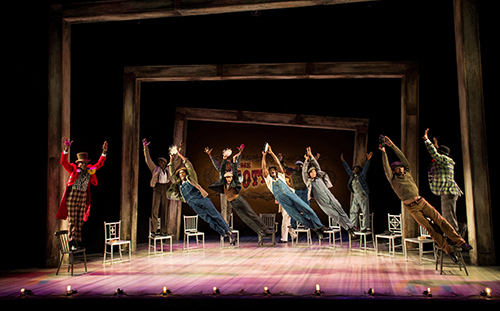
Who are the Scottsboro Boys? This muddy chapter of American History began on 25th March 1931, when nine black boys, aged between 13 and 19, stepped off a train, were falsely accused of rape by two white Alabaman women, imprisoned and sentenced to death. Their tale is not common knowledge, nor is it widely taught, despite being seminal in the rekindling of the interracial movement for equality. John Kander and Fred Ebb with this new work have at last given the Scottsboro boys a chance to be heard; the nine youths, who set out that Spring in search of a better life were exonerated posthumously on April 19th 2013.
Expertly straddling the line between entertaining and educational, The Scottsboro Boys proves that musical theatre is an impacting form to be reckoned with. Kander and Ebb’s enticing score lulls its audience into a false sense of security before reminding us, with the ominous pounding of a bass drum, that what we are witnessing is an all too true story. Like Chicago with its razzle-dazzle, the musical uses a framing device to demonstrate the fallibility of the legal system and the trivialisation of the boy’s defence; disingenuous, satirical performances expose the clownery that the boys were repeatedly subjected to within the courtroom. As a company of players in a minstrel show, the cast set about presenting the Scottsboro Boys’ story, urging the Interlocutor to, this time, let them tell it ‘truthfully.’ Working alongside this, David Thompson’s nuanced book humanises each individual boy, ensuring that we are never too distanced from their ill-fated reality. For example, Eugene Williams – the youngest of the nine (played by Idriss Kargbo), poignantly reveals that he doesn’t even know the meaning of that of which he has been falsely accused.
Director and choreographer Susan Stroman also ensures differentiation between story and show – her movement pointed, exaggerated, explosive and yet delicate and still when necessary. Employing only chairs and planks of wood, the state of Alabama, the train that carried the boys in and the jail cell that held them are evoked with crystal clarification. We, the now complicit audience, are trusted to use our own powerful imaginations to fill in the gaps.
And the execution of this challenging, meaty material is in the safe hands of a brave and talented cast. Commanding triple-threat, Kyle Scatliffe leads as Haywood Patterson but the whole company – detailed, nimble and skilled – are worthy of the standing ovation they received on opening night in London. Demonstrating the insignificance of colour, the cast play multiple roles, switching instantaneously between race or gender or both, doubling also as accused and accuser. Interlocutor (played by a fragile Julian Glover – the only white man in the cast) attempts to keep control over the show (“Show your gratitude, bang those tambourines!”), but the boys are doing it their way now and his power gradually slips away from him. The once enthusiastic minstrels refuse to hypocritically sing Southern Days or perform the Cakewalk, for they will be anything but liars and they are determined to eventually escape the stereotypes they are securely locked up in.
At times this musical is uncomfortable to watch, but isn’t it good for us to occasionally endure discomfort? It’s too late to save the real Scottsboro Boys but their case of racial injustice is just one of many. Some are forgotten, some still simmer beneath the surface, but if audiences can see The Scottsboro Boys and join Kander, Ebb, Thompson and Stroman in giving a voice to the marginalised, then justice might eventually be found. Until then, exonerated all too late, the discontented ghosts of the past remain, shaking their heads at the sight of our plagued and troubled society.
***** (5 stars)
Runs until 21st December 2013
More info
View our exclusive interviews with the cast:-
Be the first to comment